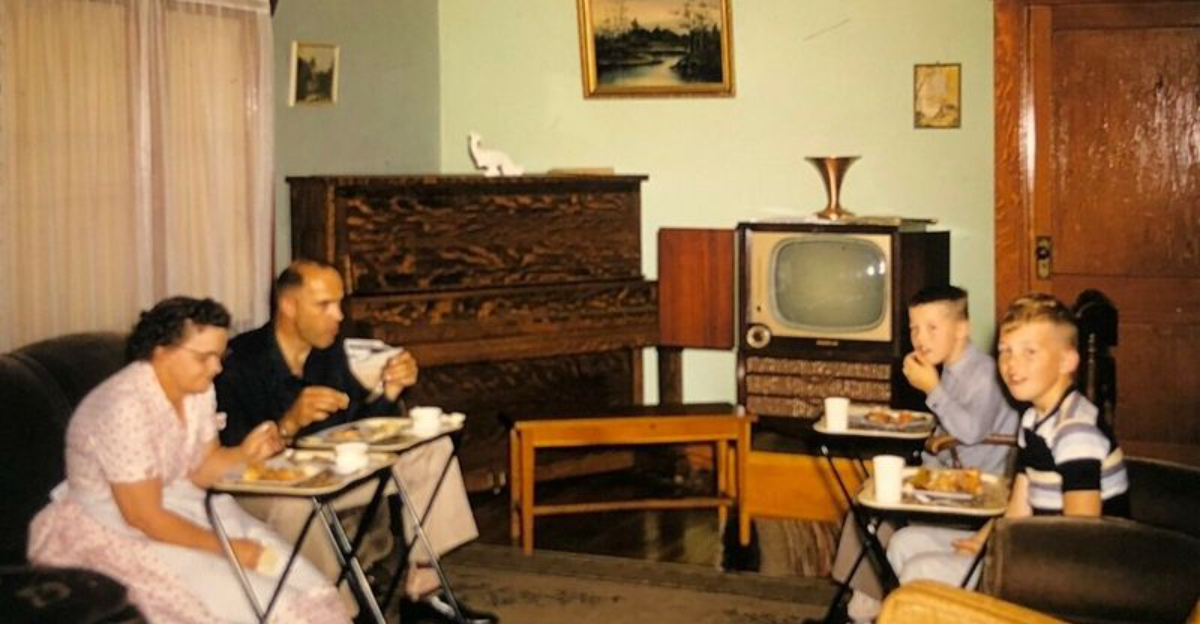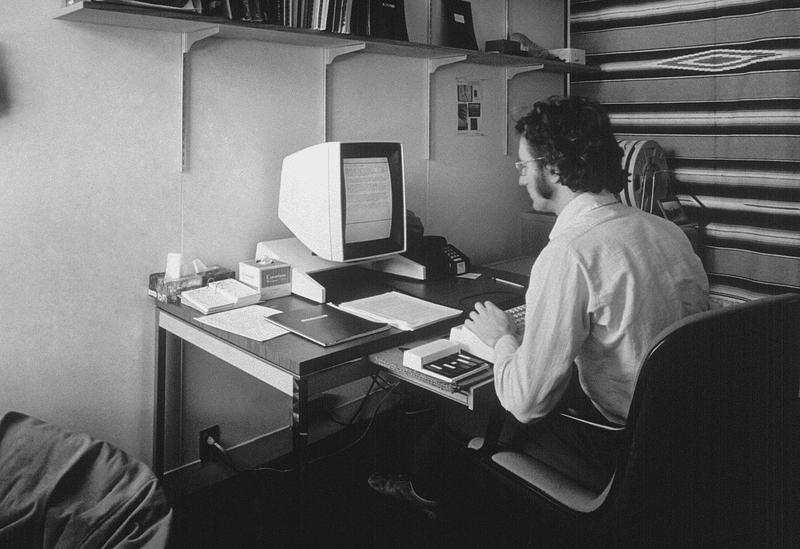Boomers often dismissed certain technologies and trends as absurd, only to see them become integral parts of modern life. From computers to mobile phones, what was once ridiculed is now indispensable. This blog post explores 20 such instances, highlighting how perceptions have drastically shifted over time.
1. “Who needs a computer at home?”
Back in the day, computers seemed like oversized calculators. Many boomers couldn’t fathom their importance, dismissing them as extravagant toys for tech enthusiasts. Fast forward to today, where they’re crucial for everything—from managing finances to storing treasured family photos. It’s strange to think about a world without these technological wonders. What was once an object of ridicule is now an essential household item, pivotal in everyday life. The shift in perception has been nothing short of revolutionary, transforming how people live, work, and connect globally.
2. “Kids these days with their video games!”
Remember when arcades were the hangout spots for kids? Boomers often grumbled about children wasting time on video games. Yet, those ‘mind-numbing’ activities have blossomed into a massive $200 billion industry. Today, classic arcades are celebrated as retro experiences, and gaming is a social and competitive sport. The evolution of video games from a mere hobby into a cultural phenomenon is a testament to their staying power and appeal across generations. They’ve become an integral part of entertainment and social interaction.
3. “Why would anyone carry a phone around?”
In the age of payphones, the idea of carrying a phone everywhere seemed absurd to many boomers. “Why not just use the phone booth?” was a common refrain. Fast forward to today, where mobile phones are extensions of ourselves, serving as communication hubs, cameras, and more. Landlines are nearly a relic of the past. The transition from skepticism to acceptance highlights the profound impact of mobile technology on our lives, reshaping the way we stay connected and access information. This embrace has revolutionized social interaction and access to information.
4. “Music videos are a fad.”
When MTV launched in 1981, many boomers shrugged off music videos as fleeting novelties. Little did they know, this innovation would redefine music promotion and fan engagement. Today, music videos are an artistic staple, and MTV has shifted away from its original concept entirely. The legacy of music videos lives on through platforms like YouTube, where artists continue to creatively express their work in visual form. Their initial dismissal was premature, as these videos have become a powerful medium for storytelling and artistic expression in the music industry.
5. “You’ll ruin your eyes sitting that close to the TV!”
The warning, “Don’t sit too close to the TV,” was a common boomer refrain, echoing concerns about eye strain. Ironically, today’s screens are held much closer, with smartphones and tablets being a constant presence. The proliferation of digital devices has normalized close-up viewing, reshaping daily habits and media consumption. Despite the cautionary tales, technology has become so ingrained in life that these old warnings seem quaint. The evolution of screen technology has made devices more accessible and versatile, changing how society interacts with content.
6. “Nobody needs more than three TV channels.”
Boomers grew up with limited television choices, primarily ABC, CBS, and NBC. They couldn’t imagine needing more. However, the advent of cable and streaming services has shattered that notion, providing thousands of channels and on-demand content. This explosion of choice has transformed viewing habits, with many opting for customized streaming over traditional broadcasts. The once unimaginable array of options has led to a fragmented yet personalized media landscape, signaling a significant shift in how entertainment is consumed.
7. “Why would I want to bank online?”
The concept of online banking was met with distrust by many boomers, who preferred in-person transactions. Yet, the convenience and efficiency of digital banking have won over most skeptics. As branches close and online platforms thrive, the banking landscape has evolved to prioritize accessibility and ease. The trust once reserved for face-to-face interactions has shifted towards digital security protocols. This change reflects the broader acceptance of technology’s role in simplifying complex tasks, illustrating the adaptability and resilience of modern financial systems.
8. “Disposable cameras are a waste of money!”
There was a time when film development was cherished, and disposable cameras seemed frivolous. Now, they’ve become nostalgic novelties, reminding us of simpler times. Digital photography and smartphones have largely replaced these once-dismissed items, transforming how memories are captured and shared. The sentimental value of disposable cameras lies in the anticipation and surprise of developed photos. Today, they are celebrated for their quirky charm and vintage appeal, highlighting a longing for tangible memories in an era of instantaneous digital sharing.
9. “Microwaves will give you cancer!”
The microwave oven, once dubbed the ‘radiation box,’ was met with fear and suspicion by boomers. Concerns about health risks seemed to overshadow its convenience. Today, nearly every kitchen has one, and it’s a staple for quick meals. The microwave’s journey from suspicion to acceptance mirrors society’s broader relationship with technology, revealing how initial fears can be overcome by practicality. Its ubiquity demonstrates the shift in priorities towards convenience and efficiency, reshaping culinary habits and meal preparation in modern homes.
10. “Kids don’t need seat belts!”
Boomers recall a time when seat belts were optional, and kids roamed freely in the back of station wagons. However, safety standards have evolved, with seat belts becoming mandatory and crucial for car safety. The stark contrast between past and present underscores the advancements in vehicle safety technology and public awareness. This change has reshaped how families travel, prioritizing protection over comfort. The cultural shift towards safety-first reflects a growing understanding of risk and the importance of preventative measures in everyday life.
11. “Why would I need a remote control? Just get up!”
In the era of manual tuning, remote controls were seen as unnecessary luxuries. Boomers often scoffed at the idea, preferring the ‘exercise’ of getting up to change channels. Yet, today, remotes are indispensable, controlling everything from TVs to smart homes. Losing a remote can result in chaos, highlighting its integration into daily life. This transformation from luxury to necessity illustrates technology’s ability to reshape habits and expectations, making once unimaginable conveniences part of the routine fabric of modern living.
12. “Credit cards are dangerous!”
In an era where cash was king, credit cards were deemed risky by many boomers, who feared debt and financial instability. However, today’s economies thrive on credit systems, with tap-to-pay technology simplifying transactions. The shift from cash to digital payments underscores a broader acceptance of financial technology, enabling greater convenience and security. Credit cards have become integral to financial life, facilitating global commerce and personal finance management. This evolution reflects changing attitudes towards money management and technological integration.
13. “Nobody will ever replace vinyl records!”
The shift from vinyl to CDs was met with skepticism by boomers who cherished their vinyl collections. However, streaming services have rendered both formats nearly obsolete, offering instant access to vast music libraries. The nostalgia for vinyl persists, celebrated for its tangible quality and warmer sound. Despite the digital takeover, vinyl has experienced a resurgence, embraced by enthusiasts for its vintage appeal and authentic listening experience. This journey from doubt to digital dominance highlights the ever-evolving landscape of music consumption and appreciation.
14. “Fast food is a scam!”
Boomers often dismissed fast food as unhealthy and overpriced. Yet, the fast food industry has grown into a $200 billion empire, with chains like McDonald’s becoming global icons. The convenience and affordability of fast food have secured its place in modern life. Even as health-conscious movements rise, the demand for quick and tasty meals persists. Services like Uber Eats have further integrated fast food into daily routines, highlighting the tension between convenience and health. This evolution underscores the complex relationship between dietary choices and lifestyle demands.
15. “Why would I want a car that talks to me?”
Boomers laughed at the concept of talking cars, dismissing GPS systems as unnecessary gadgets. Today, voice-activated navigation is standard, guiding drivers with precision. The technology has advanced beyond simple directions, offering traffic updates and hands-free control. This integration of smart technology has transformed travel, enhancing safety and convenience. The shift from skepticism to reliance highlights the adaptability of drivers and the ongoing innovation in automotive technology. It reflects a broader acceptance of artificial intelligence in daily life, shaping modern transportation experiences.
16. “Kids don’t need helmets!”
In an era of carefree childhoods, helmets were seen as unnecessary. Boomers grew up riding bikes bareheaded, prioritizing freedom over safety. Today, helmets are mandated by law, protecting young riders on bikes and scooters. This cultural shift underscores the growing emphasis on safety and risk awareness. The transition reflects changes in societal attitudes towards injury prevention, prioritizing long-term health over short-term convenience. Helmets have become symbols of responsible parenting and community care, embodying a collective commitment to safeguarding future generations.
17. “Who needs air conditioning in cars?”
The concept of air-conditioned cars was once seen as a luxury by boomers who relied on ‘4-60’ AC—four windows down at 60 mph. Today, climate control is standard, with remote-start features enhancing comfort. This shift underscores the prioritization of convenience and quality of life in modern vehicles. The evolution of car amenities reflects broader trends in consumer expectations and technological innovation. Air conditioning has become an essential feature, transforming travel experiences and highlighting the increasing demand for comfort in everyday life.
18. “TV dinners will ruin the family meal!”
TV dinners were once seen as threats to family togetherness, offering quick meals at the cost of shared experiences. Boomers lamented their rise, fearing the erosion of family rituals. Today, meal kits and delivery services have replaced even TV dinners, catering to busy lifestyles. This shift reflects changing dynamics in family life, where convenience often trumps tradition. The evolution of meal options highlights the balancing act between preserving family bonds and adapting to modern time constraints. It captures the tension between nostalgia and progress in culinary culture.
19. “Why would I shop from a catalog on a computer?”
The idea of shopping online seemed ludicrous to many boomers, who treasured the tactile experience of browsing through Sears catalogs. Yet, the digital age has revolutionized retail, with online shopping becoming the norm. Amazon’s rise and the decline of traditional retailers illustrate this seismic shift. The convenience and variety offered by e-commerce have reshaped consumer habits, making physical stores less central to shopping experiences. This transformation reflects broader changes in the economy and technology, as digital platforms redefine how people access products and services.
20. “Nobody will ever need more than 640KB of memory!”
The belief that 640KB of memory was sufficient for anyone seems quaint now. This quote, often misattributed to tech leaders, reflects a time of limited vision. Today’s devices boast gigabytes of RAM, essential for running complex applications. The exponential growth in computing power highlights technology’s rapid advancement and adaptability. What once seemed excessive is now a baseline requirement, illustrating the unpredictable nature of technological evolution. The journey from modest expectations to immense capabilities captures the essence of innovation and progress in the digital age.




















